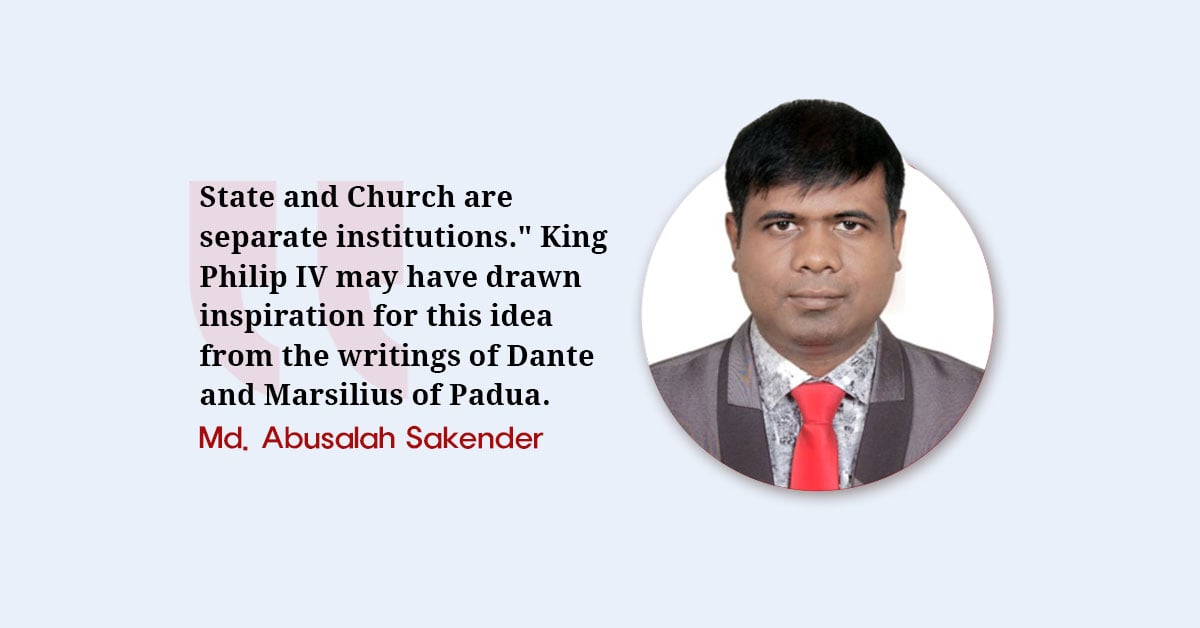

“State and Church are separate institutions.” King Philip IV may have drawn inspiration for this idea from the writings of Dante and Marsilius of Padua. The famous secular political thinker Dante claims in his book De Monarchia that, “without mediation by way of the papacy,” kings or emperors received power directly from God.
He also asserts that the Church and the State are both independent institutions, with no higher earthly authority. Both are accountable only to God, who is their final authority. Perhaps King Philip IV accepted this theory and thus sought to separate his power from the Church.
Alternatively, the writings of Marsilius of Padua had a profound impact on King Philip IV. The central theme of Marsilius’s thought is that the Church is not a separate institution; rather, it is a department of the State. According to him, the Church or the Pope has no independent power.
Instead, the Pope exercises authority only as a representative of the State. In his book Defensor Pacis, Marsilius declares that the Pope can exercise power only for religious purposes and must operate under the control of the State, just like any other department.
Marsilius strongly argues against the Pope’s jurisdictional power. He maintains that if a person commits a religious crime, the Pope has no right to punish them, as God will ultimately judge them after death. He also opposes the imposition of papal law and Church taxation.
According to Marsilius, the Church cannot impose taxes on people’s property; such property must be managed by a State-appointed administrator, such as a religious court. Another important claim made by Marsilius is that the king has the right to dismiss the Pope or the pontiff. His theory had a significant impact on Christians and contributed to the conciliar movement, which eventually led to limits being placed on papal authority.
On the other hand, the papal bull Unam Sanctam—the most famous papal document of the Middle Ages—was issued by Pope Boniface VIII in 1302 and claimed that the Pope held supremacy over emperors and kings in both spiritual and temporal matters.
Boniface declared that salvation was impossible outside the Church. The bull emphasized that the Church held final authority over spiritual power, and that the Pope, as head of the Church, extended this power over kings and emperors.
Another key element of Unam Sanctam was the idea that although kings and emperors had the right to wield temporal power, the supreme authority to grant or restrict that power resided with the Church—specifically the Pope. The bull stated that without the Church’s approval, rulers had no right to exercise temporal authority.
Moreover, if they misused it, the Church had the power to judge them. Conversely, spiritual authority was considered infallible and could not be judged by secular rulers—only by God.
In essence, Unam Sanctam sought to establish papal supremacy over kings and emperors in the name of God.
This declaration was not the first attempt to assert papal supremacy. It had deep intellectual roots, especially in the political thought of Saint Ambrose, his disciple Saint Augustine, Pope Gregory, and Thomas Aquinas. Saint Augustine argued in his book The City of God that “Almighty God is the source of power,” a notion echoed in Unam Sanctam. The bull reinforced the idea that God is the final judge of both spiritual and temporal matters.
The political philosophy of Thomas Aquinas also played a significant role in shaping the ideas behind Unam Sanctam. Pope Boniface VIII may have been directly influenced by Aquinas. Both emphasized human salvation as the Church’s ultimate purpose. Aquinas argued that the Church is the supreme authority over all Christians and that only the Church may exercise power over earthly institutions.
However, he acknowledged that the State serves as the initial step toward salvation, while final salvation lies with the Church. He hoped that the State would cooperate with the Church.
Aquinas likened the role of the State to that of a ship’s engineer and the Church to its sailors, concluding that the State must follow the Church’s lead. He also affirmed that the Pope had the right to appeal to kings and emperors—a view consistent with the declarations in Unam Sanctam. Thus, Aquinas’s political thought was a primary source for the idea of papal supremacy expressed in the bull.
However, the declaration of Unam Sanctam ultimately failed, largely because powerful monarchs like Philip IV of France strongly opposed it. Following its proclamation, Philip IV sought to curtail papal power. To that end, he convened an assembly and presented twenty-nine accusations against Pope Boniface VIII. Five archbishops and twenty-one bishops, along with several senior clergy members, supported the king’s position.
Eventually, King Philip IV ordered an attack on the Pope’s residence. The house was plundered, and Pope Boniface VIII was killed by the royal army. With the Pope’s death and the events that followed, King Philip IV was able to successfully separate his authority from that of the Church.
(Md. Abusalah Sakender is an Assistant Professor in the Department of Islamic History & Culture at Jagannath University, Dhaka, Bangladesh)